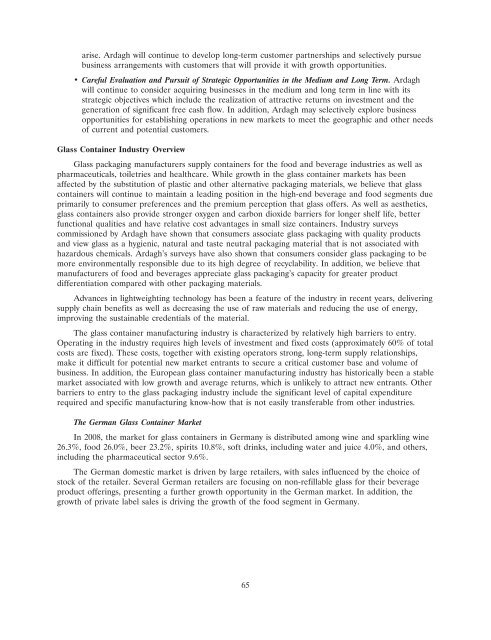Ardagh Glass Finance plc - Irish Stock Exchange
Ardagh Glass Finance plc - Irish Stock Exchange
Ardagh Glass Finance plc - Irish Stock Exchange
Create successful ePaper yourself
Turn your PDF publications into a flip-book with our unique Google optimized e-Paper software.
arise. <strong>Ardagh</strong> will continue to develop long-term customer partnerships and selectively pursue<br />
business arrangements with customers that will provide it with growth opportunities.<br />
• Careful Evaluation and Pursuit of Strategic Opportunities in the Medium and Long Term. <strong>Ardagh</strong><br />
will continue to consider acquiring businesses in the medium and long term in line with its<br />
strategic objectives which include the realization of attractive returns on investment and the<br />
generation of significant free cash flow. In addition, <strong>Ardagh</strong> may selectively explore business<br />
opportunities for establishing operations in new markets to meet the geographic and other needs<br />
of current and potential customers.<br />
<strong>Glass</strong> Container Industry Overview<br />
<strong>Glass</strong> packaging manufacturers supply containers for the food and beverage industries as well as<br />
pharmaceuticals, toiletries and healthcare. While growth in the glass container markets has been<br />
affected by the substitution of plastic and other alternative packaging materials, we believe that glass<br />
containers will continue to maintain a leading position in the high-end beverage and food segments due<br />
primarily to consumer preferences and the premium perception that glass offers. As well as aesthetics,<br />
glass containers also provide stronger oxygen and carbon dioxide barriers for longer shelf life, better<br />
functional qualities and have relative cost advantages in small size containers. Industry surveys<br />
commissioned by <strong>Ardagh</strong> have shown that consumers associate glass packaging with quality products<br />
and view glass as a hygienic, natural and taste neutral packaging material that is not associated with<br />
hazardous chemicals. <strong>Ardagh</strong>’s surveys have also shown that consumers consider glass packaging to be<br />
more environmentally responsible due to its high degree of recyclability. In addition, we believe that<br />
manufacturers of food and beverages appreciate glass packaging’s capacity for greater product<br />
differentiation compared with other packaging materials.<br />
Advances in lightweighting technology has been a feature of the industry in recent years, delivering<br />
supply chain benefits as well as decreasing the use of raw materials and reducing the use of energy,<br />
improving the sustainable credentials of the material.<br />
The glass container manufacturing industry is characterized by relatively high barriers to entry.<br />
Operating in the industry requires high levels of investment and fixed costs (approximately 60% of total<br />
costs are fixed). These costs, together with existing operators strong, long-term supply relationships,<br />
make it difficult for potential new market entrants to secure a critical customer base and volume of<br />
business. In addition, the European glass container manufacturing industry has historically been a stable<br />
market associated with low growth and average returns, which is unlikely to attract new entrants. Other<br />
barriers to entry to the glass packaging industry include the significant level of capital expenditure<br />
required and specific manufacturing know-how that is not easily transferable from other industries.<br />
The German <strong>Glass</strong> Container Market<br />
In 2008, the market for glass containers in Germany is distributed among wine and sparkling wine<br />
26.3%, food 26.0%, beer 23.2%, spirits 10.8%, soft drinks, including water and juice 4.0%, and others,<br />
including the pharmaceutical sector 9.6%.<br />
The German domestic market is driven by large retailers, with sales influenced by the choice of<br />
stock of the retailer. Several German retailers are focusing on non-refillable glass for their beverage<br />
product offerings, presenting a further growth opportunity in the German market. In addition, the<br />
growth of private label sales is driving the growth of the food segment in Germany.<br />
65
















